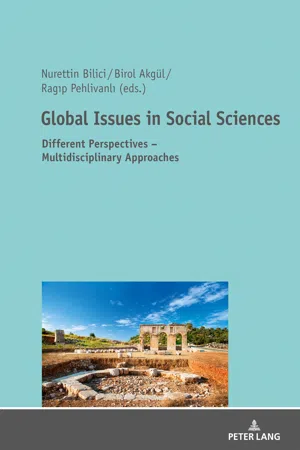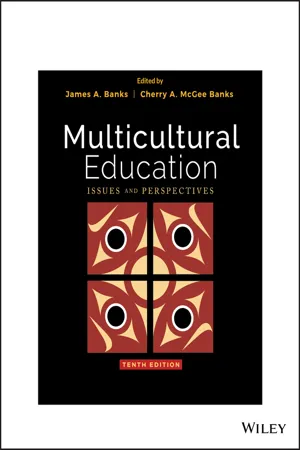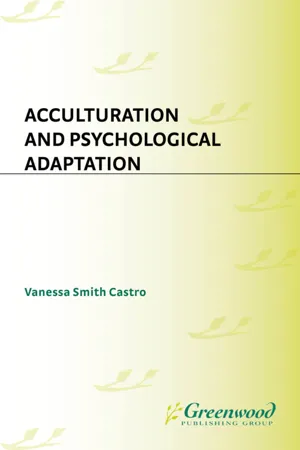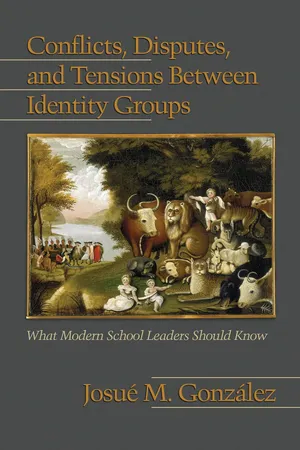Geography
Acculturation
Acculturation refers to the process through which individuals or groups adopt the cultural traits or social patterns of another group. This can occur through direct contact, migration, or colonization, and often involves changes in language, customs, and beliefs. In geography, acculturation can be observed in the blending of different cultural practices within a specific region.
Written by Perlego with AI-assistance
Related key terms
1 of 5
9 Key excerpts on "Acculturation"
- eBook - PDF
Global Issues in Social Sciences
Different Perspectives Multidisciplinary Approaches
- Nurettin Bilici, Birol Akgül, Ragip Pehlivanli(Authors)
- 2018(Publication Date)
- Peter Lang Group(Publisher)
Acculturation is defined as the growth of the common area occurred by the intensification of interaction between cultures (Bayraç, 2003: 49). Acculturation means the cultural change process which an individual come over in the wake of cultural contact. This cultural contact starts when an immigrant goes into a new country, and as well as adjusting to the new life in resettlement, Acculturation process reveals (Birman et al., 2014: 60). Acculturation has been conventionally researched within psychological, anthropological, and sociological perspectives (Buscemi, 2011: 42). Now, here it has been taken as a cultural perspective. Thus, relations between migration and culture and Acculturation as a result of these relations are explained in this section. 3.1 Migration and culture Nowadays, migration is discussed in terms of cultural perspective. This thinking wave becomes more apparent on migration studies linking migra- tion and culture. From anthropological view, migration is considered as a cultural phenomenon and a complement of processes rather than locational displacement and demographic, structural/institutional change dimensions emphasized in sociology (Çakır, 2011: 131). Immigrants inherited cultural characteristics of their original culture and they carry significantly differenti- ated beliefs, values, and customs with this inherited culture to new country as they go (Serafica, 2014: 145). Migration acts refers to contacts between different cultures. In respect to contacts between social groups under the influence of cultures, Acculturation is conceptualized (Ramos-Villagrasa et al., 2011: 64). Acculturation is an inter- action and change process between two different cultures. The process of accul- turation sometimes leads to disappearance of other cultures by the fact that a culture becomes active, but sometimes it emerges as an advanced understanding of the common values being preserved (Yılmaz Çakmak, 2013: 55–56). - eBook - PDF
Multicultural Education
Issues and Perspectives
- James A. Banks, Cherry A. McGee Banks, James A. Banks, Cherry A. McGee Banks(Authors)
- 2019(Publication Date)
- Wiley(Publisher)
Acculturation refers to the typically asymmetrical process of culture change as a result of contact and intermingling between different social groups. Dis- sonant Acculturation (Qin, 2006) represents one effect of Acculturation as when the school-age children of recent immigrant families learn how to speak English and participate in U.S. culture more quickly than their parents. In contrast to assimilation and Acculturation, which assume static and essentialized views of culture and cultural groups, the phenomenon of transculturation has been receiving increased attention. In the 21st century, the concomitant expansion of technology with political and economic changes across the globe—globalization— contributes to an accelerated circulation and flow of peoples, ideas, and goods across national borders affording the formation of transcultural practices and the emergence of new kinds of hybrid identities (Appadurai, 1996; Burbules & Torres, 2000; González, 2016). Educational research illustrates that transfronterizx students, a subset of trans- national students, who regularly cross the US-Mexico border to attend school, engage in transcul- tural and translanguaing practices (Convertino, 2018; de la Piedra, Araujo, & Esquinca, 2018). 31 2.1 Getting to Know Culture At the same time, as cultural practices are “deterritorialized”— detached from local con- texts—due to the migration of peoples and flows of culture, tensions over cultural maintenance, often expressed through xenophobic and racist nationalistic rhetoric and policies, are on the rise. Nevertheless, the once preeminent idea of culture as bounded, holistic, and static—a “laundry list of cultural traits” (Spindler, 1996), a set of contending “billiard balls” (Wolf, 1982)—remains untenable in the 21st century. Instead, culture is increasingly viewed as dynamic, interactional, and emergent. - Pamela Balls Organista, Gerardo Marin, Kevin M. Chun(Authors)
- 2009(Publication Date)
- SAGE Publications, Inc(Publisher)
These early social scientists initially defined Acculturation as a process of change that occurs when individuals from different cultures interact and share a common geographical space following migration, political conquest, or forced relocation. Acculturation has such theoretical and practical significance in ethnic psychology that much of the rest of this book will refer to its influence in the same fashion as culture and ethnicity. Indeed, much of the behavior of Carlos, Maria, and Josefina as described in the story that begins this chapter reflects differences in their levels of Acculturation. As is often found among first generation individuals who show low levels of Acculturation, Carlos struggles to maintain not only the language of his country of origin, but also its cultural practices and values. Maria, on the other hand, also a first generation individual, has learned English, has a number of friends who are not Latinos, and feels comfortable interacting with people of diverse ethnic backgrounds. Josefina, as a more acculturated second generation Latina, often finds herself in conflict with the traditional practices of her parents’ country of origin. While bilingual, she prefers to speak in English; she changes her name to “Jessie,” and considers some practices that were normative in Puerto Rico to be old-fashioned although she enjoys its food, music, and other cultural expressions. Much of the early research on Acculturation suffered severe conceptual limitations including a simplistic assumption that Acculturation inevitably leads to a weakening of one’s original cultural identity and practices. This assumption reflects a unidirectional model of Acculturation in which culture change is thought to occur in one direction—people move away from their culture of origin and toward the dominant group during resettlement in a new country.- Michael Bender, Byron G. Adams(Authors)
- 2021(Publication Date)
- Cambridge University Press(Publisher)
30 David L. Sam and Colleen Ward While remote Acculturation refers to contact with a specific, geograph- ically distant culture, globalization is linked to contact with a much wider range of cultural spheres and communities (i.e., global culture). Globalization-based Acculturation has been discussed by Ozer, Bertelsen, Singla, and Schwartz (2017) in reference to cultural identity negotiation in Ladakhi youth in India. Moreover, research by Buchan et al. (2011) conducted in United States, Italy, Russia, Argentina, South Africa and Iran has demonstrated that “an inclusive social identification with the world community is a meaningful psychological construct” (p. 821). Following this line of research, Kunst and Sam (2013b) have suggested that identification with global culture may function as a resource, particularly for minority members who affiliate with neither their ethnic nor national cultures. This was borne out in their study with European Muslims, where a global identity attenuated the negative rela- tionship between marginalization and sociocultural adaptation. Others have suggested that a more dramatic revisioning of Acculturation is required. Van Oudenhoven and Ward (2013) maintain that with increas- ing within-society cultural diversity, transnationalism and globalization, cultural blending, hybridizing and creolization are more likely to occur, which blurs the boundaries of traditional ethnic and national cultures and calls for alternative conceptualizations of the changes that arise from inter- cultural contact. Recently, Morris et al. (2015) introduced “polycultural psychology,” arguing that individuals’ relationships to cultures are not categorical but rather partial and plural. As an extension of the dynamic constructivist perspective, polyculturalism assumes individuals engage with some elements of their primary culture and some elements of multiple other cultures and that they may be influenced by cultures in both assimi- lative and contrastive ways.- eBook - PDF
- Guido Bolaffi, Raffaele Bracalenti, Peter Braham, Sandro Gindro, Guido Bolaffi, Raffaele Bracalenti, Peter Braham, Sandro Gindro(Authors)
- 2002(Publication Date)
- SAGE Publications Ltd(Publisher)
A ABORIGINE: see NATIVE Acculturation (It. acculturazione ; Fr. Acculturation ; Ger. Akkulturation ) Deriving from the word ‘culture’, the term ‘Acculturation’ indicates the processes of transforma-tion and ADAPTATION which take place within cultures when two or more groups – each of which has speci-fic cultural and behavioural models – enter into relations with one another. An established part of the lexicon of cultural anthropology for more than 60 years, the term ‘Acculturation’ was first defined by a subcommittee of the United States Social Science Research Council – composed of three anthropologists, R. Linton, M. J. Herskovits and R. Redfield – appointed to decide upon the meaning of the term and, thus, provide a point of reference for later discussions. Accord-ing to the Memorandum that they pro-duced, Acculturation includes all phenomena in which groups of indivi-duals – each group having a different cultural background – interact in a continuous and first-hand manner and thus implement further transformations in the original cultural model of one or both cultural groups. Prior to this definition, in 1880, J. W. Powell, Director of the American Bureau of Ethnology (Powell, 1880), had already written that the force of Acculturation was changing the linguistic traditions of American Indians through the loan of sounds and words and the crushing presence of millions of civilized people (our emphasis) ( CIVILIZATION ). Today the term ‘Acculturation’ essentially refers to the phenomena of adaptation and transfor-mation which derive from situations of conflict between different cultures, the settling of various cultural groups in a common territory as a result of the so-called ‘great migration’ (to the USA in the nineteenth century) and the increased exchange of communications which has led to the creation of the ‘global village’ ( GLOBALIZATION ). Acculturation was compared with ENCULTURATION by M. J. - eBook - PDF
Acculturation
A Personal Journey across Cultures
- John W. Berry(Author)
- 2019(Publication Date)
- Cambridge University Press(Publisher)
All of these approaches attempt to understand the development and display of human behaviour as a function of the process of group and individual adaptation to ecological, cultural, biological and sociopolitical (intercultural) settings. To summarize, the ecological and sociopolitical lines of influence have equal conceptual status as factors in the development and display of human behaviour. The actual degree of influence of each factor is variable across settings, popula- tions and individuals. The inclusion of the sociopolitical line in the ecocultural framework sets the stage for a more detailed examination of the processes and outcomes of Acculturation. 2 Acculturation 2.1 Definition of Acculturation Acculturation is the process of cultural and psychological change that takes place as a result of contact between two or more cultural groups and their individual members. At the cultural group level, it involves changes in social structures and institutions and in cultural norms (Redfield et al., 1936). At the individual psychological level, it involves changes in people’ s behavioural repertoires (including their food, dress, language, values and identities) and their eventual adaptation to these intercultural encounters (Thurnwald, 1932). Acculturation is a mutual process in which these changes take place in all groups and individuals in contact. The concept is also complex and multifaceted (Rudmin, 2009) with widely varying definitions (Ward, 2001). Despite this complexity, two formulations of the concept of Acculturation have been widely quoted, and remain a foundation for the field. The first is: 10 Elements in Psychology and Culture Acculturation comprehends those phenomena which result when groups of individuals having different cultures come into continuous first-hand contact, with subsequent changes in the original culture patterns of either or both groups . - eBook - PDF
- Richard T. Schaefer(Author)
- 2008(Publication Date)
- SAGE Publications, Inc(Publisher)
Acculturation, the first step of the adaptation process, is defined by different patterns of learning the language and culture of the host country. Assimilation, the final stage of the process, is defined as the process by which people who do not have a com- mon cultural heritage come to share the same body of opinions, traditions, and allegiances. These concepts advance the notion of straight-line movement into the social and economic mainstream, accompanied by the loss of original language and culture. Today, many scholars argue that contemporary immigration has significantly complicated these models. Immigration today comprises a diverse set of arrival and return patterns, socioeconomic backgrounds, and ways of adapting to U.S. society. That is, theories coined in earlier immigrant contexts— theories that argue for the notion of uniform assim- ilation as a precondition for social and economic advancement—are increasingly implausible. Some scholars argue that this type of assimilation never hap- pened at all. Rather, the melting pot myth emerged from the need to pressure immigrants into the White Anglo-Saxon Protestant cultural mainstream. In real- ity, immigrant groups are constantly re-created by new experiences, even after profound language, cus- tom, and culture losses. Beyond this, patterns of assimilation usually depict an upwardly mobile journey; that is, the longer immi- grants stay in the United States, the better they do in school, health, and income. However, several scholars have argued that social and economic divisions are creating new patterns of entrance into U.S. culture. Factors such as education, race, ethnicity, and socioe- conomic status all shape immigrants’ experiences in the United States. Consequently, today some immi- grants, such as those from South Asia, are climbing the socioeconomic ladder at rates never before seen in U.S. - eBook - PDF
- Vanessa S. Castro(Author)
- 2003(Publication Date)
- Praeger(Publisher)
In sum, research guided by two-dimensional models has shown that conceptualization of Acculturation as a multidimensional process is especially helpful to understand cultural change and interethnic relations in ethnically plural contexts. Researchers have identified a number of important factors influencing the way in which individuals tend to acculturate. At the group level, nature of the intergroup contact, attitudes in the dominant society to- ward immigration and toward specific ethnic groups, as well as specific char- acteristics of acculturating groups such as status and distribution appear to be consistent predictors of Acculturation strategies. At the individual level, socio- economic status, gender, age, and experience of previous interethnic contact seem to have great impact. In particular, those variables that are important predictors of intergroup relations are also relevant determinants of accultura- tion strategies. 26 Acculturation AND PSYCHOLOGICAL ADAPTATION A FRAMEWORK FOR RESEARCH ON Acculturation WITH ETHNIC GROUPS The study of the Acculturation process has shifted from an anthropological focus on changes in cultural systems to an intergroup perspective of the psy- chological process and outcomes of intercultural encounters. Currently, im- portant insights about Acculturation derive not only from cross-cultural psychology, but also largely from research on intergroup relations. Thus, sub- stantial research on psychological Acculturation has been amassed over recent decades within both research traditions. The result of this concern is a new psychology of Acculturation that has produced a complex literature, character- ized to some extent by a lack of agreement around key concepts and variables affecting individuals' adaptation in modern plural societies. Recently, there have been attempts to integrate the field's large and diverse literature (Berry, 1997; Rogler, 1991; Ward & Rana-Deuba, 1999). - Josué M. González(Author)
- 2006(Publication Date)
- Information Age Publishing(Publisher)
Given the purposes of this book, we will not examine these processes any further. But three cautions must be set out at this point. The first is that the summary coverage of Acculturation and enculturation presented here is simplistic. Both processes are complex and the movement from one to 8 Conflicts, Disputes, and Tensions Between Identity Groups the other is more complex and less constant than the summary suggests. Neither is as linear or straightforward as my explanations may suggest. Each has intricacies and tangents that require a fuller exploration than is pos- sible here. Readers wishing to learn more about Acculturation or encultura- tion are urged to consult one of the many excellent texts in the fields of social psychology and anthropology, both of which deal with these topics in slightly different ways. The second cautionary note is that the defini- tions of Acculturation and enculturation as the terms are used here, are not used uniformly in the professional literature. Some authors use the terms synonymously. I have used the term Acculturation as it is commonly used in anthropology, since these disciplines are more oriented toward groups. Enculturation may also be used when a sociological or psychological em- phasis may be more appropriate. Psychology tends to focus more on the individual. The third caution is that there is a wonderful difference between hu- mans and other mammals: humans have cultures while other mammals only have instincts. Even animals with good memories—elephants perhaps—are missing a culture in the sense we use that term in the social sciences. Cul- ture, although unique and complex, is nonetheless learned behavior. As such, it is acquired in similar ways to other learned behaviors. While one’s culture is absorbed painlessly throughout the early years of life, it is a trans- parent process unless the youngster is faced with a need to accommodate more than one culture at the same time.
Index pages curate the most relevant extracts from our library of academic textbooks. They’ve been created using an in-house natural language model (NLM), each adding context and meaning to key research topics.








